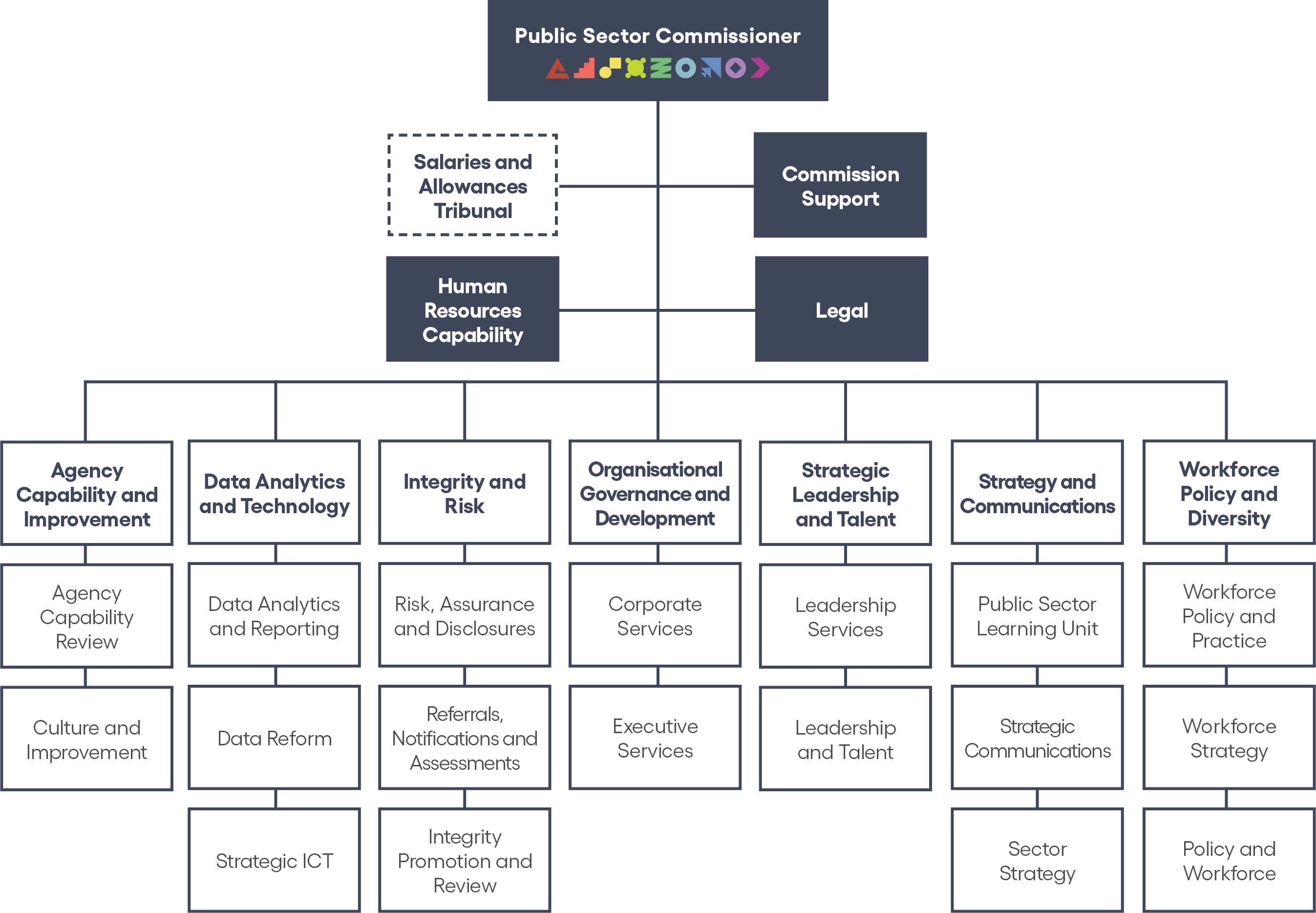Our role is described in legislation, including the Public Sector Management Act 1994, as strengthening the efficiency, effectiveness and capability of the public sector to meet existing and emerging needs; and deliver high quality services.
Our legislated role also includes maintaining and advocating for public sector professionalism and integrity.
Our Commissioner
Show moreThe Public Sector Commissioner is an independent officer committed to ensuring a high performing public sector. The primary functions of the Commissioner are to:
- promote the efficiency and effectiveness of the sector
- provide advice on the management of the sector
- plan for the future management and operation of the sector
The Commissioner also has roles in preventing and dealing with minor misconduct, and promoting diversity and inclusion for the general government sector.
Sharyn O’Neill PSM was appointed as Public Sector Commissioner on 30 July 2018.
Our structure
Show moreOur remit and responsibilities
Show moreOur remit
Our job is to develop a future-fit public service for the people of Western Australia. We do this by shaping, building and regulating the public sector so it can tackle the public policy challenges of both today and tomorrow.
Shaping is about setting values, standards and expectations. Building is about helping our people do their best work and working with agencies to be the best they can be. Regulating is about providing assurance, oversight and reporting. We do this work with others.
In essence, we are about the performance and improvement of both individuals and agencies.
Our role is described as strengthening the efficiency, effectiveness and capability of the public sector to meet existing and emerging needs, and deliver high quality services. This includes maintaining and advocating for public sector professionalism and integrity.
The place of the Commission with an independent Commissioner is important and unique. This independence ensures the continuity and sustainability of efforts, despite changing governments.
Our responsibilities
SHAPE the public sector
This means we:
- define the values which underpin the public sector as a whole and guide the decision-making of its leaders
- promote the public sector as a valued entity and employer motivated by pride, positive social impact and public good
- advise government of emerging trends and issues, and potential strategic interventions and initiatives; and administer the public sector legislation for government
- set out clear expectations for all public sector employees to uphold and embody the highest standards of integrity
- lead a culture of performance, excellence and care across the sector
- establish robust standards and policies for contemporary, effective people management
- outline strong standards for leadership, agency management and governance
- promote the use of diversity and inclusion as strategic levers in organisational and people management planning and processes.
BUILD the public sector
This means we:
- plan for future workforce skills and competencies needed across the sector to transform services and keep pace with changing technologies
- provide authoritative advice on legislation, directives, policies and guidelines which support workforce management
- stimulate innovation and share effective practice among agencies, together with promoting collaborative agency endeavour to achieve shared outcomes and priorities
- grow professional expertise and integrity of public sector employees and middle management to achieve capability uplift
- identify talent for future transformative leadership, and invest in targeted development and experience to grow a leadership pipeline for succession
- develop leadership capabilities of current and potential senior-level public sector employees
- help agencies strengthen their workforce planning and practice
- collect and use workforce data for strategic and predictive analytics to inform future business requirements
- provide agencies with meaningful data to improve key aspects of their management and performance
- work with agencies to assess and improve their own performance, culture and capability, and to leverage sector-wide knowledge.
REGULATE the public sector
This means we:
- provide assurance to government about agencies’ compliance with required standards, legislation and policy
- oversee agency performance, thereby maintaining the integrity of the sector
- develop measures of diversity, inclusion and wellbeing to monitor progress, detect and remove barriers, and design interventions
- have processes in place for employees to report breaches of integrity standards without fear of retribution or harassment
- conduct reviews, special inquiries and investigations on matters relevant to public sector administration, governance, service delivery and/or workforce management; or as directed under the Act
- implement rigorous and transparent procedures in the appointment and remuneration of senior level public sector employees, and hold them accountable for performance
- report publicly on the state of the public sector
- implement appropriate indicators to evaluate and monitor the progress and impact of workforce policies and processes to inform decision-making.



